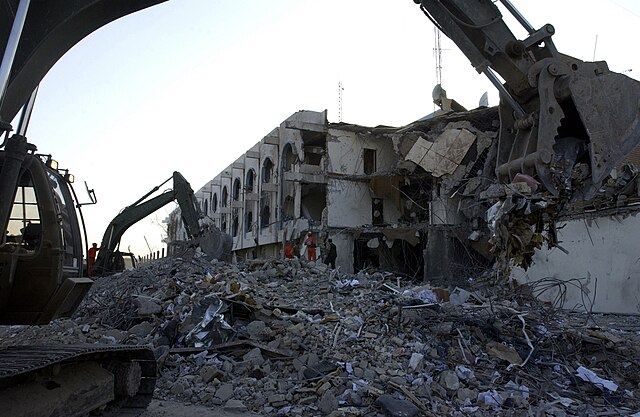The Yazidi genocide was perpetrated by the Islamic State throughout Iraq and Syria between 2014 and 2017. It was characterized by massacres, genocidal rape, and forced conversions to Islam. The Yazidi people, who are non-Arabs, are indigenous to Kurdistan and adhere to Yazidism, which is an Iranian religion derived from the Indo-Iranian tradition. Over a period of three years, Islamic State militants trafficked thousands of Yazidi women and girls and killed thousands of Yazidi men; the United Nations reported that the Islamic State killed about 5,000 Yazidis and trafficked about 10,800 Yazidi women and girls in a "forced conversion campaign" throughout Iraq. By 2015, upwards of 71% of the global Yazidi population was displaced by the genocide, with most Yazidi refugees having fled to Iraq's Kurdistan Region and Syria's Rojava. The persecution of Yazidis, along with other religious minorities, took place after the Islamic State's Northern Iraq offensive of June 2014.

Left-to-right from top: Yazidi refugees receiving support from the International Rescue Committee; American relief worker of USAID conversing with Iraqi locals near Sinjar; packaged bundles of water inside of a C-17 Globemaster III prior to an emergency airdrop by the United States Air Force.
A Yazidi mass grave in the Sinjar region in 2015
The ruins of Sinjar in July 2019 after the invasion of the Islamic State
Defend International provided humanitarian aid to Yazidi refugees in Iraqi Kurdistan in December 2014.
The Islamic State (IS), also known as the Islamic State of Iraq and the Levant (ISIL), the Islamic State of Iraq and Syria (ISIS) and by its Arabic acronym Daesh, is a transnational Salafi jihadist group and a former unrecognised quasi-state. Its origins were in the Jai'sh al-Taifa al-Mansurah organization founded by Abu Omar al-Baghdadi in 2004, which fought alongside al-Qaeda during the Iraqi insurgency. The group gained global prominence in 2014, when its militants successfully captured large territories in northwestern Iraq and eastern Syria, taking advantage of the ongoing Syrian civil war. By the end of 2015, it ruled an area with an estimated population of twelve million people, where it enforced its extremist interpretation of Islamic law, managed an annual budget exceeding US$1 billion, and commanded more than 30,000 fighters.
The Al-Askari Mosque, one of the holiest sites in Shia Islam, after the first attack by Islamic State of Iraq in 2006
Mugshot of Abu Bakr al-Baghdadi by US armed forces while in detention at Camp Bucca in 2004
The UN headquarters building in Baghdad after the Canal Hotel bombing, on 22 August 2003
Pro-YPG demonstration against ISIL in Vienna, Austria, 10 October 2014








